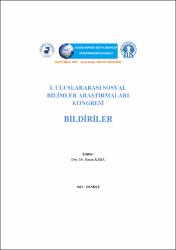AK Parti Döneminde Türkiye’nin Balkanlarda Kamu-Kültürel Diplomasi Aracılığıyla Toplumsal-Kültürel Etkinliğini Artırma Politikası

Göster/
Erişim
info:eu-repo/semantics/openAccesshttp://creativecommons.org/publicdomain/zero/1.0/Tarih
2015-12-28Üst veri
Tüm öğe kaydını gösterKünye
Ekşi M. (2015). "Turkey’s Policy for Enhancing the Societal-Cultural Effectiveness in Balkans Through Public-Cultural Diplomacy During AK Party Era", 1st International Research Congress on Social Sciences, Proceeding Book, Bosnia and Herzegovina, ISBN: 978-975-6992-66-1, December 28, 2015.Özet
1990’larda Türkiye, Balkanlarda istikrarsızlık ve çatışmalardan dolayı doğal olarak güvenlik odaklı politika izlerken 2000’lerde bölgenin göreli istikrara kavuşmasından sonra AK Parti döneminde yumuşak güç odaklı toplumsal-kültürel etkinliğini artırma politikası izlemeye başlamıştır. Buradan hareketle, AK Parti hükümetlerinin Balkan politikasının ağırlıklı olarak tarihi ve kültürel miras üzerinden formüle edildiği ileri sürülebilir. Bu çerçevede ‘AK Parti dönemi Türkiye’nin Balkan politikası, kamu diplomasisi temelli, kültürel odaklı ve yumuşak güç araçlarına dayanan bir diplomasi’ olarak tanımlanabilir. Türkiye’nin Balkanlarda etkinliğini ortak tarih ve kültüre özellikle Osmanlı mirasına vurgu yaparak artırma politikası hem bölgede hem de akademik camiada bir tehdit ve yayılmacı-hegemonik bir politika olarak Yeni-Osmanlıcılık algısına yol açmıştır. Nitekim Ekim 2009 yılında Dışişleri Bakanı Davutoğlu’nun Bosna’da Yunus Emre Türk kültür merkezinin açılışında Osmanlı tarihine vurgu yaparak bölge ülkelerini Türkiye’nin liderliğinde bütünleşmeye çağıran konuşması, Yeni-Osmanlıcı algının temel dayanağı olmuştur. Oysa Türkiye’nin bölge ülkelerini AB ve NATO ile entegrasyona teşvik etmesi ve desteklemesi, Yeni-Osmanlıcı iddialarla çelişmektedir. Diğer taraftan AK Parti döneminde açılan yumuşak güç kurumları olan Yunus Emre Enstitüsü Türk kültür merkezleri, Yurtdışı Türkler ve Akraba Toplulukları Başkanlığı, daha önce açılan fakat daha etkin hale getirilen TİKA, Kamu Diplomasisi Koordinatörlüğü ve Diyanet, TRT, Anadolu Ajansı Balkanlarda Türkiye’nin tarihi ve kültürel bağlarının yeniden güçlendirilmesine yönelik önceki dönemlerden farklı kamu diplomasisi olarak tanımlayabileceğimiz bir politika izlenmeye başlamıştır. Kamu diplomasisi yaklaşımı çerçevesinde Türkiye, Balkan toplumlarıyla doğrudan ilişki kurma politikasına geçmiştir. Bu da Türkiye’ye bölgede hem çok daha geniş bir etkinlik ve hareket alanı sunarken hem de bölge halklarıyla derin ilişkiler inşa etmesini sağlamaktadır. Bu bağlamda, Türkiye’nin Balkan politikasının kamu diplomasisi kurumlarının etkinlikleri üzerinden toplumsal ve kültürel boyutu analiz edilmiştir. Bu makalede AK Parti döneminde Türkiye’nin Balkan politikası, eğitim diplomasisi, diaspora diplomasisi, kültürel diplomasisi, TV diplomasisi ve hepsini içeren kamu diplomasisi çerçevesinde ele alınmıştır. In 1990s Turkey had intrinsically pursued security-focus policy due to instability and conflicts in the Balkans, but it has unlikely adopted a soft power-oriented policy for enhancing societal-cultural effectiveness during AK Party era after the relative stabilization in the region in 2000s. From this point of view, it could be assert that the ruling government has principally formulated Balkan policy through the historical and cultural legacy. In this context,’Turkey's Balkan strategy during AK Party decade defines as “public diplomacy-based, cultural diplomacy-focus and the instruments of soft power-oriented’. Turkey’s policy for enhancing its influence by accentuating common culture and history in particular the legacy of Ottoman has led to a perception of threat as Neo-Ottomanist, revisionist and hegemonic policy both in the region and in academic circle. Therefore, the Foreign Minister Davutoğlu’s speech of calling for Turkey’s leadership to the integration of countries of the region by underling the Ottoman history in the inauguration of the Yunus Emre Institute Turkish Cultural Center in Bosnia has been a mainstay of the Neo-Ottoman perception. Whereas, Turkey’s encouraging and supporting the integration of the countries of region with the EU and NATO is in contradiction with the Neo-Ottoman claims. On the other hand, this policy can be defined as public diplomacy that is quite different from the previous periods of Turkey’s Balkan policy. Ak Party has initiated to implementation of soft power institutions such as Yunus Emre Institute Cultural Centers and the Office of Public Diplomacy, The Presidency for Turks Abroad and Related Communities opened by the ruling government and previously opened but made more effective institutions of TİKA, TRT, Anadolu Agency and Diyanet Foundation in order to strengthen Turkey’s historical and cultural ties in the Balkans by AK Part. In the framework of public diplomacy approach Turkey has maintained a policy of building direct relations with the Balkan people. To that effect, this policy provides Turkey both a much wider sphere of influence and building deeper relations with the living people of the region. In this context, Turkey’s social and cultural dimension of the Balkan policy is analyzed in terms of the activities of public diplomacy institutions. In this article, Turkey’s Balkan policy is scrutinized within the framework of education diplomacy, diaspora diplomacy, cultural diplomacy, TV diplomacy and public diplomacy comprising all of them.
Koleksiyonlar
Aşağıdaki lisans dosyası bu öğe ile ilişkilidir:



















